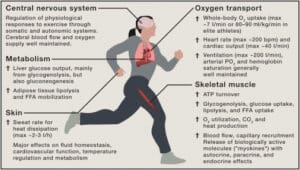Regular exercise can have many positive effects on your body, including:
- Cardiovascular health: Exercise can improve your cholesterol, lower your blood pressure, and reduce your risk of heart attack and stroke.
- Mental health: Exercise can help with symptoms of depression and anxiety, and can improve your mood and sleep.
- Weight management: Exercise can help you maintain a healthy weight and prevent diabetes.
- Bone health: Exercise can reduce your risk of osteoporosis and fractures.
- Cancer risk: Exercise can reduce your risk of colon and breast cancers.
- Brain health: Exercise can reduce your risk of dementia.
- Aging: Exercise can slow the aging process.
- Energy: Exercise can increase your energy levels.
- Appetite: Exercise can help you control your appetite.
-

do exercise daily
Exercise can also help your body burn fat by converting it into glucose to provide energy for your muscles. This effect is especially noticeable if you exercise before meals.
To get the most health benefits, you should try to exercise nearly every day. This could mean 30 to 40 minutes of moderate exercise, like walking, or 15 to 20 minutes of vigorous exercise. You can also add strength training and stretching two to three times a week.
Improves Sleep Quality · Enhanced melatonin production: Physical activity boosts melatonin levels, a hormone that helps regulate your sleep-wake cycles.
Improving sleep: Even small amounts of exercise can regulate your sleep patterns, helping you to get better quality sleep and feel well-rested in the morning.
How does exercise improve mental health?
Exercise is not just about aerobic capacity and muscle size. Sure, exercise can improve your physical health and your physique, trim your waistline, improve your sex life, and even add years to your life. But that’s not what motivates most people to stay active.
People who exercise regularly tend to do so because it gives them an enormous sense of well-being. They feel more energetic throughout the day, sleep better at night, have sharper memories, and feel more relaxed and positive about themselves and their lives. And it’s also a powerful medicine for many common mental health challenges.
Regular exercise can have a profoundly positive impact on depression, anxiety, and ADHD. It also relieves stress, improves memory, helps you sleep better, and boosts your overall mood. And you don’t have to be a fitness fanatic to reap the benefits. Research indicates that modest amounts of exercise can make a real difference. No matter your age or fitness level, you can learn to use exercise as a powerful tool to deal with mental health problems, improve your energy and outlook, and get more out of life.
Sharper memory and thinking. The same endorphins that make you feel better also help you concentrate and feel mentally sharp for tasks at hand. Exercise also stimulates the growth of new brain cells and helps prevent age-related decline.
Higher self-esteem. Regular activity is an investment in your mind, body, and soul. When it becomes habit, it can foster your sense of self-worth and make you feel strong and powerful. You’ll feel better about your appearance and, by meeting even small exercise goals, you’ll feel a sense of achievement.